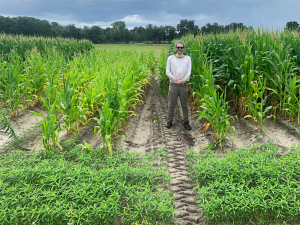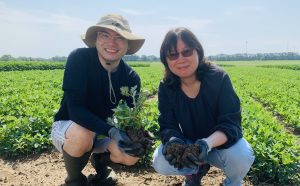A team of UF/IFAS researchers will use federal funding to study the impact of crop rotation and grazing on soil health and productivity. The goal is to explore innovative methods to enhance agricultural sustainability. Scientists in the Department of Soil, Water, and Ecosystem Sciences (SWES) hope to unravel the complexity of soil health driven by the relationships between crop rotation and livestock grazing. Their findings could lead to more resilient and productive farming systems. That would benefit producers, especially those in regions like north Florida where soil quality poses significant challenges.
Soil health is the cornerstone of sustainable agriculture, supporting robust crop yields and reducing reliance on chemical fertilizers and pesticides. However, intensive farming practices often lead to soil degradation. This is typically the case in the southeastern United States, where coarse-textured soils and a hot, humid climate exacerbate the problem.
Traditional crop rotation involves alternating different types of cash crops in the same field to improve soil structure and fertility. Recent evidence, though, suggests intensive rotations with reduced crop diversity can harm soil health. Dr. Sunny Liao is leading the project. The SWES associate professor of soil microbial ecology said they will integrate perennial grasses and cover crops into traditional crop rotations. In addition, the study will investigate the effects of optimal grazing practices.
“We think increasing the functional diversity of crops and incorporating grazing will enhance soil biodiversity. That should improve nutrient cycling and ultimately boost crop productivity,” Liao explained. “Healthier soils will better sustain high crop yields and withstand environmental stresses.”
Research Objectives
The project includes four parts. First, it aims to evaluate soil health indicators. The team will study soil biodiversity, functional networks of soil biota, and biota-driven carbon and nutrient cycling. That involves examining how these factors vary under different crop rotations and grazing practices over time at different locations.

Second, they will assess crop yield and quality, along with soil fertility and non-biological indicators of soil health. Dr. Gabriel Maltais-Landry, SWES associate professor of sustainable nutrient management systems, said that involves comparing the effects of diversified crop rotations across different soil types.
“Then we will explore how the integration of grazing practices affects soil fertility, greenhouse gas emissions, nutrient losses, and crop yield,” he added. “This will help us understand the best way to incorporate livestock into sustainable farming systems.”
The final part of the project is sharing the research findings.
“We have identified various channels, including field days, workshops, and online resources,” Liao explained. “We want this study to benefit farmers and extension agents as well as 4-H and other interested groups.”
Advanced Techniques and Analysis
To analyze soil health, DNA/RNA amplicon sequencing will profile microbial communities in the samples. Quantitative PCR will measure the abundance of these communities. The researchers will assess functional diversity through metagenomics. These methods allow for a comprehensive understanding of how crop rotation and grazing affect soil biota and their interactions. Dr. Kaile Zhang, a postdoctoral associate in the Liao Lab, said machine learning models will identify key microbial players and their roles in nutrient cycling.
“Our use of machine learning models can revolutionize soil management,” Zhang added. “Linking biological soil properties with agroecosystem multifunctionality will help us predict these intricate soil dynamics. That will enable us to make more precise and informed management decisions.”

Transforming Farming Practices
There is significant potential for this research to transform farming practices. If producers can better understand how different crop rotations and grazing practices affect soil health, they can adopt new management strategies. They will be better equipped to enhance productivity while maintaining ecological balance.
“Our findings will provide farmers with actionable insights on how to sustainably improve soil health and crop yields,” Liao explained. “This is crucial for the long-term viability of agriculture in the southeastern United States and beyond.”
The project team is committed to engaging with the agricultural community. In addition to in-person events, plans call for developing educational materials for students. Involving the next generation of producers and policymakers will encourage a culture of sustainable farming practices.
“Our ultimate goal is to make farming more sustainable, not just for today, but for future generations,” Liao said.
The research also involves UF/IFAS colleagues Dr. Zane Grabau, associate professor of entomology and nematology, and Dr. Sudeep Sidhu, assistant professor of agronomy. The project runs from July 2024 through June 2027. The research grant award totals nearly $750,000. It is part of a roughly $8 million effort to promote soil health. The University of Florida is one of 12 institutions to receive the funding.
This work is supported by the Agriculture and Food Research Initiative (AFRI A1401), project award no. 2024-67019-42344, from the U.S. Department of Agriculture’s National Institute of Food and Agriculture.
Any opinions, findings, conclusions, or recommendations expressed in this publication are those of the author(s) and should not be construed to represent any official USDA or U.S. Government determination or policy.
 2
2
